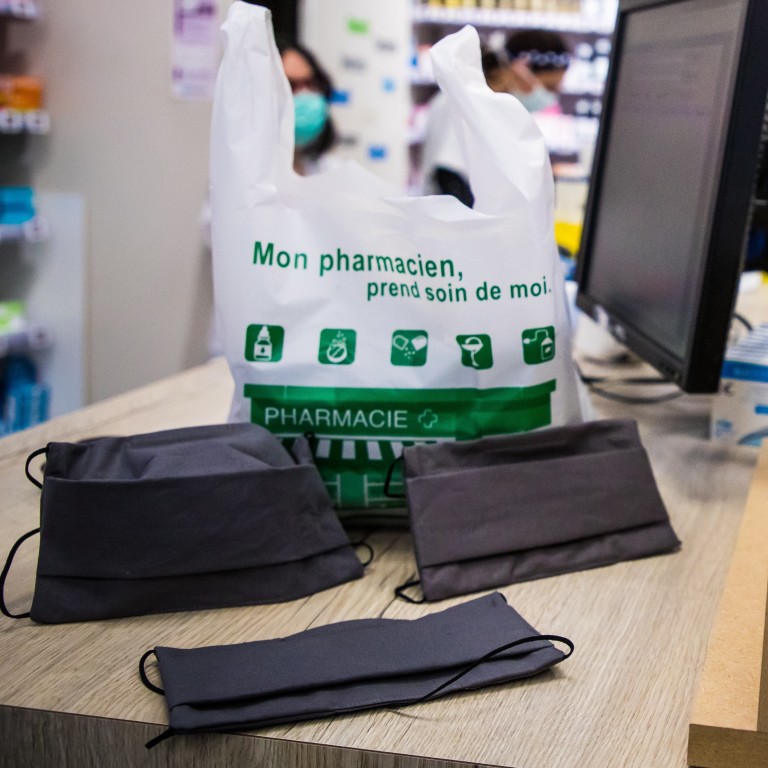
Researchers are working on reusable face masks to protect against coronavirus
- With protective gear in short supply, teams from China to Israel are trying to develop masks that can withstand repeated use
- Nanofibre product made in Hong Kong has virus filtration efficiency of 90 per cent and is said to be 10 times more breathable than N95 respirators
The highly contagious virus mainly spreads through respiratory droplets – when someone infected coughs, sneezes or talks – and contact routes, according to the World Health Organisation, and many governments recommend wearing face masks or cloth face coverings in public, especially when it is hard to keep physical distance from others.
“A good reusable mask against Covid-19 should provide high particulate filtration efficiency and bacterial filtration efficiency comparable to the standard surgical masks,” said Seeram Ramakrishna, a professor of mechanical engineering and bioengineering at the National University of Singapore.
“After proper disinfection or washing treatment, its appearance, fit, filtration efficiency and breathing resistance should not change significantly,” Ramakrishna said.
In Hong Kong, researchers at Polytechnic University’s mechanical engineering department have developed an electrostatically charged nanofibre filter that captures airborne particles or aerosols smaller than 100 nanometres in diameter – including the coronavirus.
It has a virus filtration efficiency of 90 per cent but is at least 10 times more breathable than N95 respirators – the disposable masks used by medical workers, according to two recent peer-reviewed papers published on scientific and medical research database ScienceDirect.
“This filter is equivalent to an N98 mask, meaning it can capture 98 per cent of airborne particles at 0.3 microns,” said Wallace Leung Woon-fong, chair professor of innovative products and technologies at PolyU, who led the research team.
Leung said the filter – which has a patent pending – could be disinfected with a hydrogen peroxide spray or an antiseptic mouthwash. The cloth mask in which the filter is inserted should be kept dry after washing to minimise loss of static charge, he said.
Tests showed the filtration efficiency of the masks dropped by just 1 per cent after 90 days in 80 per cent relative humidity, according to the researchers.
In South Korea, meanwhile, a team at the Korea Advanced Institute of Science and Technology in Daejeon has developed a submicron fibre filter using an electrospinning technique to produce an ultrafine fibre.
According to Kim Il-doo, who led the research team, reusable masks made from electrospun nanofibre filters can be used repeatedly if they are not damaged.
He said material used for the face masks should be stiff but breathable.
“Smaller fibre diameters are better for better filtration, but the mechanical stability of the fibres is also important,” said Kim, from the institute’s materials science and engineering department.
He recommended using ethanol to clean the filters as it would not weaken their efficiency as it might if they were put through a washing machine or even with vigorous hand washing.
In February, a company in China – where the first cases of Covid-19 were reported late last year – started making reusable face masks with nanomaterial membrane for filtering, according to state broadcaster CGTN. The Shanghai-based manufacturer said the masks could be reused up to 20 times and were on par with N95 respirators, which can block at least 95 per cent of 0.3-micron particles.
And in Israel, start-up company Sonovia has developed an antimicrobial, reusable fabric mask that it says can last up to one year. The company said the mask had a clinically validated filtration of 5 microns and could protect wearers from airborne microorganisms, with an inside layer made of polyester with an antimicrobial treatment.
But Teo Tee Hui, a senior lecturer in engineering product development at Singapore University of Technology and Design, said two-layer cotton masks had only 50 to 60 per cent filtration efficiency despite being breathable.
“Bear in mind that [cloth masks] are not certified for medical uses, and not advisable to be used in a hospital environment,” Teo said.
Wearers should also follow any instructions to maintain the masks, he said.
“As the mask is worn so close to the mouth and nose, the mask must be washed and clean after use to maintain a high hygiene level,” he said.

